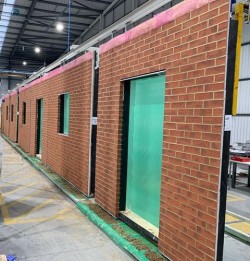Alliance of housing providers choses firms to provide panelised systems for 5,000 new build affordable homes
An alliance of housing associations brought together by the National Housing Federation has named six manufacturers to take slots on a £600m social housing framework specifically for modern methods of construction (MMC).
The chosen firms are all manufacturers of MMC category 2 construction systems, which refers to two dimensional panelised systems, and the framework will take the form of a dynamic purchasing system, enabling other firms to join at a later date.
Building Better, an alliance of 29 housing associations and councils, supported by the National Housing Federation, and national procurement consortium Procurement for Housing, have appointed the following firms onto the DPS: Future Built, LoCal Homes, Project Etopia, Roe Timberframe, Sigmat and Starship Homes.
The panelised systems provided are to be assembled on-site. The framework is worth £600m over four years and Building Better went for a dynamic purchasing system (DPS), rather than a fixed framework, so firms can join at any point during the life-span of the system.
Manufacturers wanting to join Building Better's DPS must be certified by the Buildoffsite Property Assurance Scheme (BOPAS) or assessed by building warranty provider the National House Building Council (NHBC) and their products must aim to meet the Future Homes Standard.
The category 2 segment of the offsite market is quickly evolving and Building Better hope this DPS will help the social housing sector produce about 5,000 MMC properties by 2026.
The DPS will run in parallel with Building Better's first MMC framework, which launched in July 2021, and covers category 1 volumetric 3D systems. Alliance members have put nearly 40 schemes through that framework, betting costs on more than 900 MMC homes.
Trina Chakravarti, project director of Building Better, said: "The emerging nature of this part of the MMC marketplace means that social housing organisations have, to date, been wary of category 2. Some told us they were anxious about committing to a panelised manufacturer; not knowing if the company or even this form of MMC would be around in four years.
"Because of this, we knew a different procurement approach was needed; one that would still provide high standards and ease of access like our category 1 framework, but a solution that didn't 'clip the wings' of manufacturers operating in such a fluid environment."
John Bellamy, category manager for construction & sustainability at procurement for housing (PfH) said: "A major benefit of setting up a DPS is the learning. As an alliance, we'll be able to grow our understanding of what housing organisations actually require with category 2 and the technical solutions they gravitate to. Creating a framework now would have meant guessing the answers. But a DPS allows us to gather data and feedback on products and manufacturers, educating ourselves and helping us to normalise offsite and use it at scale across the sector."
The 29 housing associations and councils that make up Building Better manage more than 215,000 homes.
Once firms have passed an additional selection procedure for the new DPS, manufacturers can bid for tenders via a call-off. The process has been 'streamlined' for social housing providers, with members receiving a tender template pack and hands-on support from Procurement for Housing.
Source: www.housingtoday.co.uk









